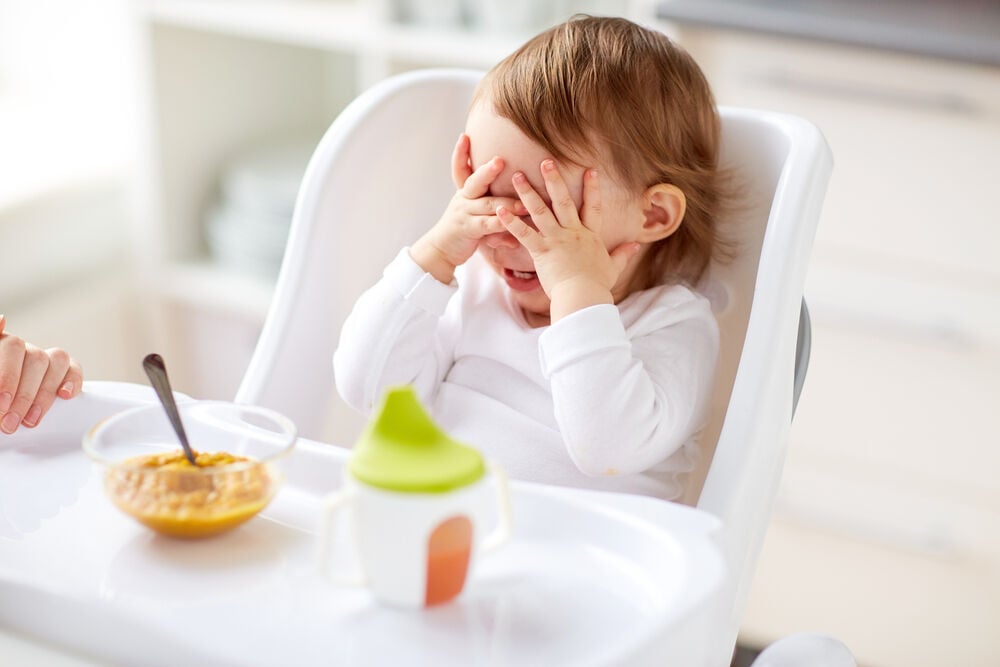Many parents have experienced the scenario of feeding their babies, only to see them push away or spit out most of the food. As frustrating and alarming as it may feel, your baby’s loss of appetite is perfectly normal. It’s just a fact of life: some babies are picky eaters. To help you, we’ve put together a list of expert and mom-approved tips for getting your little one to eat!
-
Tracking cycle
-
Getting pregnant
-
Pregnancy
-
Help Center
-
Flo for Partners
-
Anonymous Mode
-
Flo app reviews
-
Flo Premium New
-
Secret Chats New
-
Symptom Checker New
-
Your cycle
-
Health 360°
-
Getting pregnant
-
Pregnancy
-
Being a mom
-
LGBTQ+
-
Quizzes
-
Ovulation calculator
-
hCG calculator
-
Pregnancy test calculator
-
Menstrual cycle calculator
-
Period calculator
-
Implantation calculator
-
Pregnancy weeks to months calculator
-
Pregnancy due date calculator
-
IVF and FET due date calculator
-
Due date calculator by ultrasound
-
Medical Affairs
-
Science & Research
-
Pass It On Project New
-
Privacy Portal
-
Press Center
-
Flo Accuracy
-
Careers
-
Contact Us
Baby Doesn’t Want to Eat? Painless Tips and Tricks


Every piece of content at Flo Health adheres to the highest editorial standards for language, style, and medical accuracy. To learn what we do to deliver the best health and lifestyle insights to you, check out our content review principles.
Baby doesn’t want to eat: possible reasons
Baby cereal on the floor and peas in your loved one's hair? You might be overwhelmed with worry, but you’ll be happy to hear that your baby is only showing signs of independence. Once they reach an age of about 9 months, babies begin wanting to control their feeding time and where they put their food.
Luckily, there are a few simple tips and tricks that can help you deal with a baby’s decreased appetite. Let’s take a closer look.
Picky eater
Is your baby refusing food based on color and texture, or unwilling to try anything new? Congrats, you’ve got a picky eater on your hands!
Picky eating is a completely normal baby behavior. Between 20% and 50% of parents say that their kids are picky eaters and are dealing with a baby loss of appetite. Pushing away the spoon or turning their head can happen for dozens of reasons, including teething or an immature digestive system. It's also possible that your baby isn't yet ready for solid foods.
As long as your baby’s growth and weight gain are normal, there’s usually no need to worry.
Too much pressure
Are you constantly pushing food closer to your baby, watching their every move, and hovering over them? What if we tell you that babies can sense that you are anxious at mealtimes? And once they sense your anxiety and pressure, they’ll eat less because of it.
We understand that you might be tempted to analyze their every bite, but one way of dealing with your baby's loss of appetite is by sitting back and staying relaxed. Try to remember that playing, dropping, and smearing food is completely normal — it’s a natural part of your baby becoming familiar with the food.
If you’re spoon-feeding your little one, try following their cues as to when to bring the spoon closer to their mouth and when to stop feeding them.
Your baby is tired
Sometimes there is no grand reason why your baby doesn't want to eat — they may simply be tired and want to sleep. So, if you try to feed your baby right before a nap or bedtime, they’ll likely be uninterested. For this reason, make sure you’re offering them food when they’ve had their nap and are fully alert.
Distractions
Toys, music, people, and screens are all major baby distractions. And in some cases, your baby not eating is simply because they've become too distracted to focus on their food. To encourage eating, try creating a distraction-free environment where your baby can focus their attention on testing and enjoying the foods.
Are teething and loss of appetite connected?
According to the American Dental Association, babies begin teething when they’re somewhere between 6 and 12 months of age. One of the most common symptoms of teething is a loss of appetite.
Your baby doesn’t want to eat because of the discomfort and pain of teething. Their gums become inflamed and sore as teeth push on the gum. The pressure can make your baby’s mouth hurt, ultimately leading to a lack of appetite and skipping meals.
To help relieve their pain, there are some proven methods tested by parents and pediatricians. Some of them include using oral pain relievers, while others include rubbing your baby’s gums with a clean finger or a damp washcloth.

Here are some tips and tricks to increase the appetite of your baby and get them to start eating better.
For picky eaters
If you find yourself overly worried about your baby’s decreased appetite and eating habits, talk to your pediatrician about testing the following tricks:
- Let your baby try different textures in order to find what they like
- Never force your baby to eat — a general tip is to feed at the earliest sign of hunger and stop at the earliest sign of satiety
- Offer solid food in small increments
- Give solids two or three times a day
- Minimize distractions
- Let your baby touch their food
- If your baby only likes one food and avoids trying something new, mix together the new food with the food your baby likes
- Offer your child smaller bites, as they may get overwhelmed by a large amount of food
- Feed your baby more slowly, and feed them less
For babies who feel pressured
- Never force-feed your baby — if you’re worried, talk to your child’s doctor
- Follow their cues as to when to bring the spoon closer to their mouth and when to stop feeding
For tired babies
- Offer food when your baby feels alert and happy
- Don’t feed your baby before naptime
For distracted babies
- Create a distraction-free environment by removing screens, toys, and sounds that might attract your baby’s attention
- Feed your baby in an empty room and avoid having other people around, as they are also a major distraction
For teething babies
- If your baby is teething, offer them familiar foods, as this can give them comfort
- Relieve the pain by rubbing your baby’s gums with a damp washcloth, a clean finger, or a gum-rubbing finger pad — teething rings are another popular method of relieving the pain that comes with teething
- If necessary, use oral pain relievers (such as acetaminophen) to help with the pain
- Make sure that your child stays hydrated
Between dropping food on the floor and clamping their mouths shut, babies can be troublesome eaters. Their eating problems can be due to many things, including feeling pressured, feeling tired, or teething. But as long as your baby’s weight and health are good, there’s no need for concern. This is a vital step for your child's learning, growth, and independence. However, if you’re worried about your baby loss of appetite or if you notice a decrease in weight, call your baby’s pediatrician for help.
Take a quiz
Find out what you can do with our Health Assistant


Hey, I'm Anique
I started using Flo app to track my period and ovulation because we wanted to have a baby.


The Flo app helped me learn about my body and spot ovulation signs during our conception journey.


I vividly
remember the day
that we switched
Flo into
Pregnancy Mode — it was
such a special
moment.
Real stories, real results
Learn how the Flo app became an amazing cheerleader for us on our conception journey.




